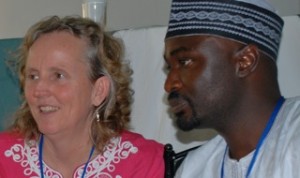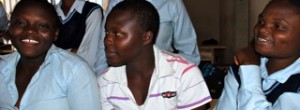Conference Photo of Participants
An Appeal to End Religious Violence
We, the participants from different parts of Nigeria and representatives from Ethiopia, Zimbabwe and United State of America at the conference organized by the New Era Educational and Charitable Support Foundation (NEECSF) in partnership with the Voice of Angels Foundation (VAF), United Religions Initiative (URI) and Interfaith Peace -building Initiative (IPI) on the occasion of the 3rd Annual International Conference on Interfaith Dialogue and Non-violence Communication on the theme of “Building Common Future through Interfaith Dialogue, Mutual understanding and the Golden Rule” which was held in Jos, Nigeria from October 27-29th, 2011
After reflecting on the urgent need for interfaith dialogue, role of religion to build peace and the teaching of the Golden Rule “Treat others the way you want to be treated” which is a common principles of different religions, indigenous cultures and secular philosophy is a fundamental principle that addresses and enhances mutual respect, human right, trust building, harmony and co-existence.
The participants of the conference appreciate the President of Federal Republic of Nigeria, His Excellency Dr. Goodluck Jonathan for supporting the African Union Interfaith Dialogue Forum launched in June, 2010 in Abuja, Nigeria. We also thank and appreciate the African Union and the African Religious Leaders Council for taking the Initiative to launch the Forum.
We, the participants of the conference, being committed to a personal pledge for peace and non-violence and agreed to work together to bring positive change in our personal lives, family, communities and country came up with the following statements:
Deeply concerned about the religiously motivated violence in most parts of the northern Nigeria which claim the precious lives of many people which also destroyed property, commit ourselves to be part of the process to end the conflict and promote a culture of peace
We express our condolence and compassion for the family of the victims who lost their loved ones and we pray for those who lost their life, and may their soul rest in peace
We call upon the religions leaders in northern Nigeria to engage actively their followers in the peace and reconciliation process and to work together to heal the wound and stops the cycle of violence and restore the mutual relationship and build trust between the religious divide in the area.
We also call upon all concern bodies including the elders, traditional leaders, the media and women of both faith (Islam and Christian) to work actively in the process of reconciliation, forgiveness and peace building within the community.
We also appeal to Rev James Wuye and Imam Nurrudeen Ashafa of the Interfaith Mediation Centre in Kaduna, who transformed the religious motivated violence in their community to a peacefully community, to share their rich experiences on the work of Interfaith co
Catching up on important meetings
Tuesday evening Nov 1st, John and I met for dinner with Sani Suleiman of JDPC. Sani is the coordinator and program director of Peace building and Conflict Transformation for the JDPC in Jos, Nigeria. He is a Muslim working for the Catholic organization. www.jdpcjos.org. Justice Development and Peace Commission/Caritas (JDPC) is responsible for social development activities in the Archdiocese. The JDPC serves all humanity regardless of religious or ethnic affiliation and is involved in different aspects of human development: Agriculture, Rural Water Supply, Human Rights/Legal Aid, Democracy Monitoring, Street Children (Under the Care for Children Programme), Prison Ministry, Women Empowerment and Conflict transformation/Peace building. Sani is a skilled moderator, peace builder, and has a regular radio presence in Jos. I met him in June at Eastern Mennonite University’s Summer Peacebuilding Institute (SPI) in Virginia. We were in the same class, Peacebuilding In Traumatized Societies and did a report together on the situation in Jos, Nigeria. We worked so well together that led to his participation in helping the facilitation of the Voices of Angels material during the Interfaith peace conference engaging the participants for two full days in “The 7 Principles of Reconciliation” (learned from Angeles Arrien and Patrick O’Neill). At our dinner when I asked straight out what he valued from the conference Oct 27-29, he said, “What amazed me was the process that engaged the individual’s heart but also the collective process.” He felt it was, “a very unique and important process.” He said it was new and that although he had been doing reconciliation work with a focus on perspectives of relationships he really learned. He said, “Apart from issues of personal transformation, connecting people and being a strong instrument of peace building, just this afternoon a participant from the conference called me and asked how I was doing. They were a stranger to me before the conference and now they are a friend. The conference provided space for sharing, learning and individual commitments.” He noted he observed my sensitivity in allowing him and Emmanuel to engage the people fully in ways that were culturally relevant. He concluded with, “You really challenged me and I wish to do the same with those whom I work.” I acknowledged his incredible skill in interactions with others while imparting the material of the principles. I was impressed by his flexibility adapting them spontaneously in culturally relevant ways, adding local moral teaching stories, adding movement, clapping, rhythm and humor. What joy he brings to the process while keeping all thoroughly engaged. What an honor to have worked with him. I asked him if he felt equipped to continue to process of engaging other in “The 7 Principles of Reconciliation” and he replied absolutely.
A Conversation With CMIA Students
Tuesday afternoon Nov 1st
I had a lovely conversation with the SS2 students (the equivalent of high school seniors.) They had been studying literature and I asked what were their favorite novels and writers. Hands down it was the novel “The Purple Hibiscus” by Ngozi Adiche and the drama “Blinkards” by Kobina Sekyi. Unfortunately, I didn’t know either one. I asked if they had ever heard of the Nigerian writer Chimananda Adichie or her books “Something Around My Neck” or “Half of a Yellow Sun”. They were unfamiliar with her or her works. I told them about Chimenanda’s TED talk, “The Danger of a Single Story.” They enjoyed hearing about her early writing as a child that reflected the English books she’d read and her breakthrough in discovering her voice in writing about her life in Nigeria. I felt her experience made a favorable impression. They then wanted my interpretation of Shakespeare’s Tempest and I had to claim ignorance as I am not familiar with that particular Shakespeare play. That seemed to amaze them. Here it was required literature in their class, and I was not familiar with it. I told them the truth that when I was their age, I preferred to be outside rather than reading indoors. That took them by surprise! The only one who smiled was somewhat of an outcast that then said quite deliberately, “My favorite thing to do is play ball outside.”
They wanted to know my favorite Nigerian food and I told them chicken and jolof rice. They thought that was very fine!




